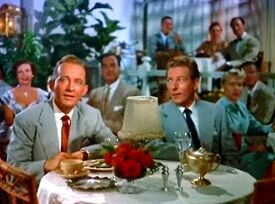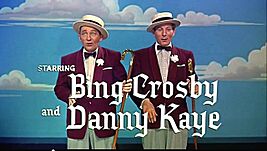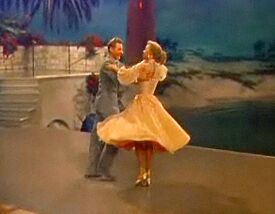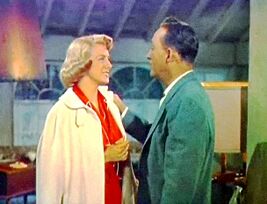White Christmas (film) facts for kids
Quick facts for kids White Christmas |
|
|---|---|
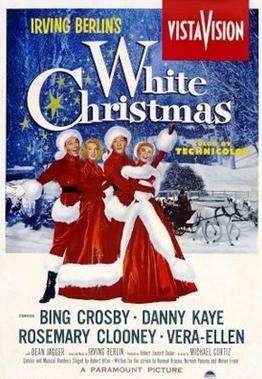
Theatrical release poster
|
|
| Directed by | Michael Curtiz |
| Produced by | Robert Emmett Dolan |
| Written by |
|
| Starring | |
| Music by | Gus Levene Joseph J. Lilley Van Cleave |
| Cinematography | Loyal Griggs |
| Editing by | Frank Bracht |
| Studio | Paramount Pictures |
| Distributed by | Paramount Pictures |
| Release date(s) | October 14, 1954 |
| Running time | 120 minutes |
| Country | United States |
| Language | English |
| Budget | $2 million |
| Money made | $30 million |
White Christmas is a famous American musical film from 1954. It was directed by Michael Curtiz and stars Bing Crosby, Danny Kaye, Rosemary Clooney, and Vera-Ellen. The movie was filmed in bright Technicolor. It features many songs by the famous songwriter Irving Berlin. This includes a new version of the popular song "White Christmas". Bing Crosby first sang this song in the 1942 movie Holiday Inn.
This film was made by Paramount Pictures. It was special because it was the first movie released using a new wide-screen technology called VistaVision. This technology made the picture look much clearer and bigger on screen.
Contents
Story of the Film
Friends in the Army
The story begins in Europe in 1944, during World War II. Broadway star Captain Bob Wallace and talented performer Private Phil Davis are entertaining soldiers. They put on a Christmas Eve show for their division. Their leader, Major General Thomas F. Waverly, gives an emotional farewell speech. He is being reassigned to a new role.
Soon after the General leaves, enemy planes attack. Phil saves Bob from a falling wall, getting a small injury himself. While they are recovering, Phil suggests they form a singing and dancing duo. Bob is not sure, but he feels he owes Phil for saving him.
Becoming Stars
After the war, Bob and Phil become a very successful song and dance team called Wallace & Davis. They also become popular musical show producers. One day, while performing in Florida, Bob gets a letter from an old army friend. The friend asks them to watch his sisters' singing act at a local nightclub.
Bob and Phil go to see Betty and Judy perform. Afterwards, they all meet up. Phil wants Bob to find a girlfriend, so he hopes Bob and Betty will like each other. While Phil and Judy are dancing, Betty tells Bob that Judy actually wrote the letter. Bob finds Judy's trick clever, but Betty thinks he is being too serious.
A Trip to Vermont
The sisters are in trouble because their landlord is falsely suing them. Phil quickly gives Betty and Judy his and Bob's train tickets to New York City. The four of them rush to the train station. The girls get Bob and Phil's sleeping room, while the guys have to sit up all night in the train's club car. Bob is not happy about this!
The girls then convince Phil and Bob to change their plans. Instead of New York, they decide to spend Christmas in Pine Tree, Vermont. The sisters are booked to perform there. When they arrive, they find no snow, which means no tourists. The Columbia Inn, where they are staying, is empty.
Helping the General
Bob and Phil are shocked to discover that General Waverly owns the inn. He invested all his money into it, and now he is almost broke. Phil and Bob decide to put on a big musical show at the inn. They hope this will attract guests and save the General's business. Betty and Judy join the other performers in the show. Meanwhile, Betty and Bob start to like each other.
Later, General Waverly gets a letter saying he cannot rejoin the army. To cheer him up, Bob plans a secret surprise. He wants to reunite their old army regiment at the inn. Bob calls a Broadway producer, Ed Harrison, for help. Ed suggests using the General's situation for free publicity for Wallace & Davis. Bob strongly refuses, saying he wants no personal gain.
Unfortunately, the housekeeper, Emma, only hears part of the conversation. She thinks Bob is trying to use the General's bad luck for his own benefit. Emma tells Betty, who then acts cold towards Bob. Bob is confused by her sudden change.
Happy Endings
Phil and Judy pretend to be engaged. They hope this will bring Betty and Bob back together. But their plan goes wrong when Betty leaves for a solo singing job in New York. When Phil and Judy tell Bob the truth, he rushes to New York to explain everything to Betty. They start to make up.
Before Bob can fully explain, he runs into Harrison. Bob then appears on Harrison's TV show. He asks the entire 151st division to come to Pine Tree to honor General Waverly. Betty realizes she misunderstood Bob and returns to Vermont just in time for the show.
On Christmas Eve, the soldiers surprise General Waverly. During the performance, Betty and Bob fully reconcile. Judy and Phil also realize they are in love. As everyone sings "White Christmas," thick snow finally falls over Vermont.
Main Actors
- Bing Crosby as Bob Wallace
- Danny Kaye as Phil Davis
- Rosemary Clooney as Betty Haynes
- Vera-Ellen as Judy Haynes
- Dean Jagger as Major General Tom Waverly
- Mary Wickes as Emma Allen
- Johnny Grant as Ed Harrison
- John Brascia as John/Johnny, Judy Haynes' dance partner
- Anne Whitfield as Susan Waverly
- Percy Helton as Train conductor
- I. Stanford Jolley as Railroad stationmaster
- Barrie Chase as Doris Lenz
- George Chakiris as Betty Haynes' background dancer
- Sig Ruman as Landlord
- Grady Sutton as General's guest
- Herb Vigran as Novello
- Leighton Noble as Novello's (Florida) bandleader (uncredited)
- Dick Stabile as Carousel Club bandleader (uncredited)
How the Film Was Made
Creating the Story
The idea for a movie based on Irving Berlin's song "White Christmas" came about in 1948. Paramount Pictures agreed to fund the movie with a $2 million budget. They would also get 30% of the profits.
Writers Mel Frank and Norman Panama were hired to add new parts for Danny Kaye. They felt the whole script needed to be rewritten, and the director, Michael Curtiz, agreed. Panama said it was a very difficult eight weeks of rewriting. Frank mentioned that writing the movie was a tough experience, but they got the job done.
Filming and Technology
The main filming took place between September and December 1953. White Christmas was the first movie to be shot using Paramount's new VistaVision process. This new technology made the colors look amazing thanks to Technicolor. It was also one of the first films to use the Perspecta directional sound system in some theaters.
Choosing the Actors
White Christmas was originally meant to bring Bing Crosby and Fred Astaire together again. They had worked together on two other musical films by Irving Berlin. However, Astaire decided not to do the movie after reading the script. Crosby also left for a short time to be with his sons after his wife passed away.
Crosby later returned to the project. Donald O'Connor was chosen to replace Astaire. But just before filming started, O'Connor got sick and had to leave. Danny Kaye then took his place. Kaye asked for a salary of $200,000 and 10% of the movie's earnings, which he received.
Many future famous performers appeared in the film. Dancer Barrie Chase had a small role. Future Oscar winner George Chakiris was one of the dancers around Rosemary Clooney. John Brascia was a lead dancer with Vera-Ellen. The photo Vera-Ellen shows of her brother Benny is actually a picture of Carl Switzer, who played Alfalfa in the Our Gang movies.
Music in the Film
All the songs in White Christmas were written by Irving Berlin. The most important song is the title song, "White Christmas". This song first appeared in the movie Holiday Inn and won an Oscar in 1942. Another song from the film, "Count Your Blessings (Instead of Sheep)", also received an Oscar nomination.
Here are the songs featured in the movie:
- "White Christmas" (sung by Crosby)
- "The Old Man" (Crosby, Kaye, and Men's Chorus)
- Medley: "Heat Wave" / "Let Me Sing and I'm Happy" / "Blue Skies" (Crosby & Kaye)
- "Sisters" (Clooney & Vera-Ellen)
- "The Best Things Happen While You're Dancing" (Kaye with Vera-Ellen)
- "Sisters (reprise)" (lip-synced by Crosby and Kaye)
- "Snow" (Crosby, Kaye, Clooney & Vera-Ellen)
- Minstrel Number: "I'd Rather See a Minstrel Show" / "Mister Bones" / "Mandy" (Crosby, Kaye, Clooney & Chorus)
- "Count Your Blessings (Instead of Sheep)" (Crosby & Clooney)
- "Choreography" (Kaye)
- "The Best Things Happen While You're Dancing (reprise)" (Kaye & Chorus)
- "Abraham" (instrumental)
- "Love, You Didn't Do Right By Me" (Clooney)
- "What Can You Do with a General?" (Crosby)
- "The Old Man (reprise)" (Crosby & Men's Chorus)
- "Gee, I Wish I Was Back in the Army" (Crosby, Kaye, Clooney & Vera-Ellen)
- "White Christmas (finale)" (Crosby, Kaye, Clooney, Vera-Ellen & Chorus)
The song "Snow" was originally written for another musical called Call Me Madam. The melody and some words were kept, but the lyrics were changed to fit a Christmas movie. For example, the original song had lines about being "Free."
Trudy Stevens provided the singing voice for Vera-Ellen in the film, including for the song "Sisters."
It was not possible to release an "original soundtrack album" for the movie. This was because Decca Records owned the rights to the soundtrack, but Rosemary Clooney was under contract with Columbia Records. So, each company released its own album. Decca's album featured Peggy Lee singing Clooney's parts, while Columbia's album had Clooney singing with her own sister, Betty.
 In Spanish: White Christmas (película) para niños
In Spanish: White Christmas (película) para niños
 | James Van Der Zee |
 | Alma Thomas |
 | Ellis Wilson |
 | Margaret Taylor-Burroughs |


